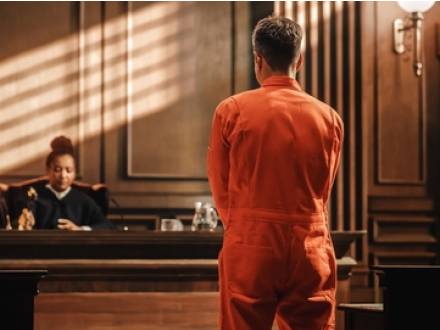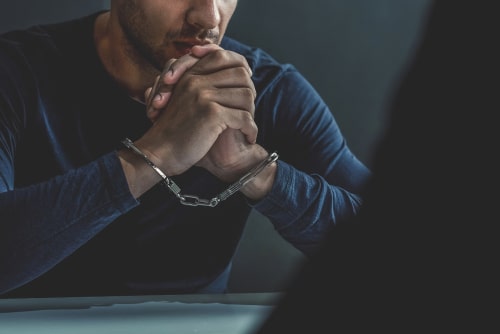Recent Blog Posts
Tips for Hiring a Criminal Defense Lawyer in Wisconsin
 It can be stressful and confusing when you find yourself in legal trouble. Whether you need help handling a legal matter or are facing criminal charges, the lawyer who takes your case can make a big difference. How do you know who to hire if you never needed a lawyer before? This article will offer tips to help you decide who should represent you. If you need any legal assistance for anything from a traffic violation to homicide, speak with a skilled Ozaukee County, WI criminal defense attorney.
It can be stressful and confusing when you find yourself in legal trouble. Whether you need help handling a legal matter or are facing criminal charges, the lawyer who takes your case can make a big difference. How do you know who to hire if you never needed a lawyer before? This article will offer tips to help you decide who should represent you. If you need any legal assistance for anything from a traffic violation to homicide, speak with a skilled Ozaukee County, WI criminal defense attorney.
Important Considerations
The legal system in Wisconsin can be complex. This is especially true if you are involved in a criminal case. Criminal defense lawyers are trained to handle these cases and ensure that their clients’ rights are protected. However, it can be difficult deciding who you want representing you in your case. When you are considering which law firm to hire, you should have the following in mind:
Flag Burning in America: Legal or a Criminal Offense?
 In today’s political landscape, many Americans pride themselves on exercising their freedom of expression. Whether their displeasure is with a specific policy, elected official, or law, they can voice their unhappiness as loudly as they want, as long as they are not hurting or harming anyone else. Over the past year, with political protests generally stopping short of physical violence, questions have been asked about what is legal in the context of political protest and self-expression. This article will review the legality of flag burning in America. If you are arrested at a protest and believe you were simply realizing your freedom of expression, contact a seasoned Jefferson County, WI criminal defense attorney who can build a strong defense and advocate for your rights.
In today’s political landscape, many Americans pride themselves on exercising their freedom of expression. Whether their displeasure is with a specific policy, elected official, or law, they can voice their unhappiness as loudly as they want, as long as they are not hurting or harming anyone else. Over the past year, with political protests generally stopping short of physical violence, questions have been asked about what is legal in the context of political protest and self-expression. This article will review the legality of flag burning in America. If you are arrested at a protest and believe you were simply realizing your freedom of expression, contact a seasoned Jefferson County, WI criminal defense attorney who can build a strong defense and advocate for your rights.
Overview of Legal Precedent for Flag Burning
The First Amendment of the Constitution of the United States protects a person’s right to burn a flag, specifically the American flag. Several decisions have been made over the years on this topic, with the Supreme Court consistently confirming that the act of burning flags falls under the greater category of free speech, which is therefore, protected by law. Some of these decisions include:
Can Police Force Phone Unlock with a Thumbprint Scan?
 According to a recent federal ruling by the US Court of Appeals for the 9th Circuit, the police can force a suspect to unlock his phone using a thumbprint scan. Although the Fifth Amendment of the US Constitution protects people from incriminating themselves, this ruling means that the protections in the amendment do not extend to a locked cell phone. This is quite a significant ruling, particularly because it covers the forced use of biometrics, an area of the law that has not been settled until now. This ruling can have far-reaching impacts on the legal processes for defendants. If you think you might be suspected of a crime, speak with a skilled Milwaukee, WI criminal defense attorney who can help you understand your rights and protect your interests.
According to a recent federal ruling by the US Court of Appeals for the 9th Circuit, the police can force a suspect to unlock his phone using a thumbprint scan. Although the Fifth Amendment of the US Constitution protects people from incriminating themselves, this ruling means that the protections in the amendment do not extend to a locked cell phone. This is quite a significant ruling, particularly because it covers the forced use of biometrics, an area of the law that has not been settled until now. This ruling can have far-reaching impacts on the legal processes for defendants. If you think you might be suspected of a crime, speak with a skilled Milwaukee, WI criminal defense attorney who can help you understand your rights and protect your interests.
When Can You Be Forced to Unlock Your Phone?
The appeals court based its decision on two previous rulings by the Supreme Court that had similar implications. In one case, Doe v. United States in 1988, a defendant was forced by the government to sign a document that provided his consent to disclosing his bank records as they related to accounts that the government was already aware of. In this case, the court believed that the act of signing the document was not an act of incrimination, especially because the bank could have ultimately been forced to produce the records. The second case, United States v. Hubbell in 2000, involved a subpoena that forced a suspect to make records available and answer questions about them. This time, the Supreme Court ruled against the government.
New Law: Repeat Offender Penalties for Multiple Counts
 Those who commit criminal offenses will usually be held accountable, even if it takes a while. The American criminal justice system revolves around the premise that punishment for a crime will deter further crime. In theory, when that lesson is learned, the person turns away from committing more criminal acts, and society benefits. Criminal defense attorneys seeking justice for their clients also factor into this equation. The end goal for all is less criminal behavior, increased safety, and a happier society.
Those who commit criminal offenses will usually be held accountable, even if it takes a while. The American criminal justice system revolves around the premise that punishment for a crime will deter further crime. In theory, when that lesson is learned, the person turns away from committing more criminal acts, and society benefits. Criminal defense attorneys seeking justice for their clients also factor into this equation. The end goal for all is less criminal behavior, increased safety, and a happier society.
Since the societal goal is to prevent criminal offenders from reoffending, making penalties for a first offense equal to those for a third offense is not the direction we want to take. If you are charged in Wisconsin with a criminal sexual offense, it is important that you speak to a knowledgeable attorney who can decipher the new laws and explain your options. This new law could affect how your Jefferson County attorney approaches your defense.
Should Cash Bail Constitutional Amendments Be Invalidated?
 Criminal justice groups in Wisconsin argue that voter-approved cash bail constitutional amendments have procedural flaws that should invalidate the amendments. The case concerns whether the ballot questions sent to the legislature were sent to the correct election officials and whether deadlines were properly met. If these allegations are true, the amendments could be removed from the state constitution and possibly placed on a future ballot.
Criminal justice groups in Wisconsin argue that voter-approved cash bail constitutional amendments have procedural flaws that should invalidate the amendments. The case concerns whether the ballot questions sent to the legislature were sent to the correct election officials and whether deadlines were properly met. If these allegations are true, the amendments could be removed from the state constitution and possibly placed on a future ballot.
The First Amendment allows judges who are determining bail to consider past convictions for violent crimes when the new charges are also for a violent crime. The Second Amendment allows judges who are considering bail when releasing a defendant before trial to consider any risk to public safety, including prior criminal history. Those facing a bail hearing in the state with a prior conviction or criminal history may find their bail denied entirely or set so high it becomes unattainable.
While it is always advisable to have a Jefferson County criminal defense attorney at bail hearings, it is even more important now. These constitutional amendments make it considerably more difficult for those with a prior criminal history to obtain bail before trial. With the new challenges to the amendments, having one’s rights protected by a skilled attorney during bail issues is particularly relevant.
Can I Reduce My Hit-and-Run Charge?
 If you are facing a hit-and-run charge in Wisconsin, you might be wondering if there are ways to reduce the severity of your case. While every situation is unique, there are several strategies that may help mitigate the consequences of a hit-and-run charge. A Wisconsin lawyer can help with your options and provide insights into the legal process.
If you are facing a hit-and-run charge in Wisconsin, you might be wondering if there are ways to reduce the severity of your case. While every situation is unique, there are several strategies that may help mitigate the consequences of a hit-and-run charge. A Wisconsin lawyer can help with your options and provide insights into the legal process.
What Are the Hit-and-Run Laws in Wisconsin?
Wisconsin Statute 346.67 outlines the duties of a driver involved in an accident. The law requires drivers to:
- Stop at the scene or as close as possible
- Provide their name, address, and vehicle registration to other involved parties
- Show their driver's license if requested
- Offer reasonable help to any injured person
Not meeting these requirements can lead to hit-and-run charges, with severity dependent on the situation.
False Criminal Abuse Allegations in Wisconsin
 Being wrongly accused of criminal misconduct, like physical assault or sexual abuse, can be a terrifying ordeal that can turn your life upside down. False allegations can result in arrest, criminal charges, incarceration, reputation damage, job loss, and more. If you are facing fabricated abuse accusations, you must act quickly to protect your rights and start building your defense. A Wisconsin lawyer can help you with strategies to combat false criminal abuse allegations.
Being wrongly accused of criminal misconduct, like physical assault or sexual abuse, can be a terrifying ordeal that can turn your life upside down. False allegations can result in arrest, criminal charges, incarceration, reputation damage, job loss, and more. If you are facing fabricated abuse accusations, you must act quickly to protect your rights and start building your defense. A Wisconsin lawyer can help you with strategies to combat false criminal abuse allegations.
Potential Defenses Against False Abuse Accusations
There are several defenses you can raise against false criminal abuse allegations in Wisconsin, depending on the facts of your case:
- You have an alibi proving you could not have committed the alleged offense
- There is insufficient evidence to support the accusations
- Witness testimony, video footage, or other evidence contradicts the allegations
I Just Got a Traffic Violation on My Boat: Now What?
 Enjoying a day out on the water can be a fantastic experience, but remember that boating comes with its own set of rules and regulations. Just like driving a car, operating a boat irresponsibly can lead to traffic violations and serious consequences. When you receive a boating traffic violation, a Wisconsin lawyer can help you understand your rights and the steps you should take next.
Enjoying a day out on the water can be a fantastic experience, but remember that boating comes with its own set of rules and regulations. Just like driving a car, operating a boat irresponsibly can lead to traffic violations and serious consequences. When you receive a boating traffic violation, a Wisconsin lawyer can help you understand your rights and the steps you should take next.
What to Know About Boating Traffic Violations
In Wisconsin, law enforcement officers are responsible for maintaining the safety of all boaters on the state’s waterways. They may issue citations for various infractions, such as:
- Operating a boat under the influence of alcohol or drugs (OWI)
Possible Defenses for an OWI Charge
 Facing an OWI (Operating While Intoxicated) charge in Wisconsin can be a stressful experience, but remember that you have rights and there are potential defenses available. A Wisconsin lawyer can help protect your rights and explore every possible avenue to achieve the best outcome for your case.
Facing an OWI (Operating While Intoxicated) charge in Wisconsin can be a stressful experience, but remember that you have rights and there are potential defenses available. A Wisconsin lawyer can help protect your rights and explore every possible avenue to achieve the best outcome for your case.
Challenge the Traffic Stop
When building a defense, one of the first things to consider is whether the initial traffic stop was lawful. Police officers must have probable cause or reasonable suspicion to pull you over. The court could deem any evidence gathered during the stop inadmissible if the police officers lacked a valid reason. Your attorney will closely examine the circumstances surrounding the stop to determine if the police violated your rights.
Probation Violations in Wisconsin
 When someone is convicted of a criminal offense, it is likely they will be sentenced to serve some amount of time in prison. Sometimes, depending on the circumstances, you might be given the option of being released on probation, which offers you a way to serve a sentence without imprisonment. This is a privilege that is only a possibility for specific types of charges and an excellent opportunity to prove that you can be trusted to follow rules and be a respectful member of society.
When someone is convicted of a criminal offense, it is likely they will be sentenced to serve some amount of time in prison. Sometimes, depending on the circumstances, you might be given the option of being released on probation, which offers you a way to serve a sentence without imprisonment. This is a privilege that is only a possibility for specific types of charges and an excellent opportunity to prove that you can be trusted to follow rules and be a respectful member of society.
If you are given a probation period instead of a prison sentence, you will also be given a set of rules to follow. There are limitations to where you can go and what you can do, and if you can abide by those rules, you can avoid jail time. However, if you violate the rules of your probation, you face serious consequences. Speak with a qualified Wisconsin criminal defense attorney who can advise you on how to proceed as you carry out a probation term.














 262-446-9222
262-446-9222 262-446-9885
262-446-9885






